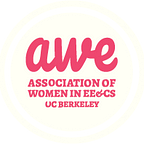An Interview with Professor Anca Dragan
In celebration of Women’s History Month, we reached out to several of the incredible female faculty on campus. We’re kicking off a series of blog posts highlighting their stories and advice for female and non-binary identifying students with Professor Anca Dragan, an Associate Professor in Berkeley’s EECS Department.
Professor Dragan is heavily involved with the research community on campus, running the InterACT Lab, which focuses on human-robot interaction, and helped found the Berkeley AI Research (BAIR) Lab and is part of its steering committee. She is a PI for the Center for Human-Compatible AI (CHAI) and has received several honors. She also founded the AI4ALL BAIR Camp at Berkeley, providing low-income high school students the opportunity to explore AI through a summer camp.
Read our full interview with Professor Dragan below!
Q: Could we get a brief background about your journey in EE/CS?
A: I really liked algorithms since middle school and attended some competitions, so I was lucky to know very early on that I wanted to go into CS. But then at the end of high school I came across Stuart and Peter’s book on AI and fell in love with this notion of giving an agent a goal and having it figure out how to get there by itself. I learned about research as a career option and resonated with this notion of my job being to invent new algorithms, especially when it came to AI. I decided to try to get involved in a research lab in college, and the rest is history. I recently got to rewrite a lot of the robotics chapter in the AI book for its latest edition, so it came full circle :)
Q: What are some challenges you encountered in the field, either in general or due to your gender identity? How did you overcome them? We would really appreciate any anecdotes you have to share!
A: Overall, I’ve had the privilege of a welcoming environment wherever I went. I know it’s not everyone’s experience, and I’ve made it one of my priorities to contribute however I can to fixing that. Of course, there were little things that happened here and there. I was told my voice/pitch/up-speak will make me not be taken as seriously. I was told to add more math to my slides because otherwise people will assume I’m not as “technical” compared to if I were a man. At a party once right after I got hired, a professor (not from Berkeley!) asked me how it felt to have gotten faculty jobs at Berkeley, Stanford, MIT, etc. because “I was a woman”. As with anything, I feel this is hardest at first when you’re new to the field. As I became more confident in myself, as I advised students who went on to faculty positions at Stanford, MIT, Princeton, as our papers got awards, I figured I must be doing something right — this made me much more comfortable to just be myself and not pay too much attention to those implicit (or explicit) biases people have. I also recently became a mom and it’s helping put things into perspective :)
Q: How do you see the field evolving ever since you first joined? Are there specific changes that you would like to see happen?
A: I’ve seen the expectations young women have when coming into the field or coming into a new job get higher and higher about what’s normal, what they deserve, how they should be treated. I think with every generation, we expect more, and I think that is a sign that things are improving.
Q: Did you have any mentors in your journey that made an impact on you?
A: Of course, I would not be here without the people who taught me and supported me. I had a great advisor for my PhD and in college, and I had an amazing high school physics teacher (her name was Nicole Becheanu and she passed away recently due to complications from COVID, which was heartbreaking to hear). Nicole even tutored me for free so I can spend that money on English lessons for tests like the SAT. She’s left a huge mark on my life and I will always be grateful.
Q: Any general advice for young women or non-binary folks interested in pursuing a career in a technical field?
A: I think my main advice is to try to not see the world adversarially — people will mess up around you, but I’ve found that oftentimes it is due to ignorance and implicit bias, not due to malice, and they are willing to be taught. I know it’s a burden to teach them, but it’s the only way to keep making progress.
Follow AWE Berkeley for more!
